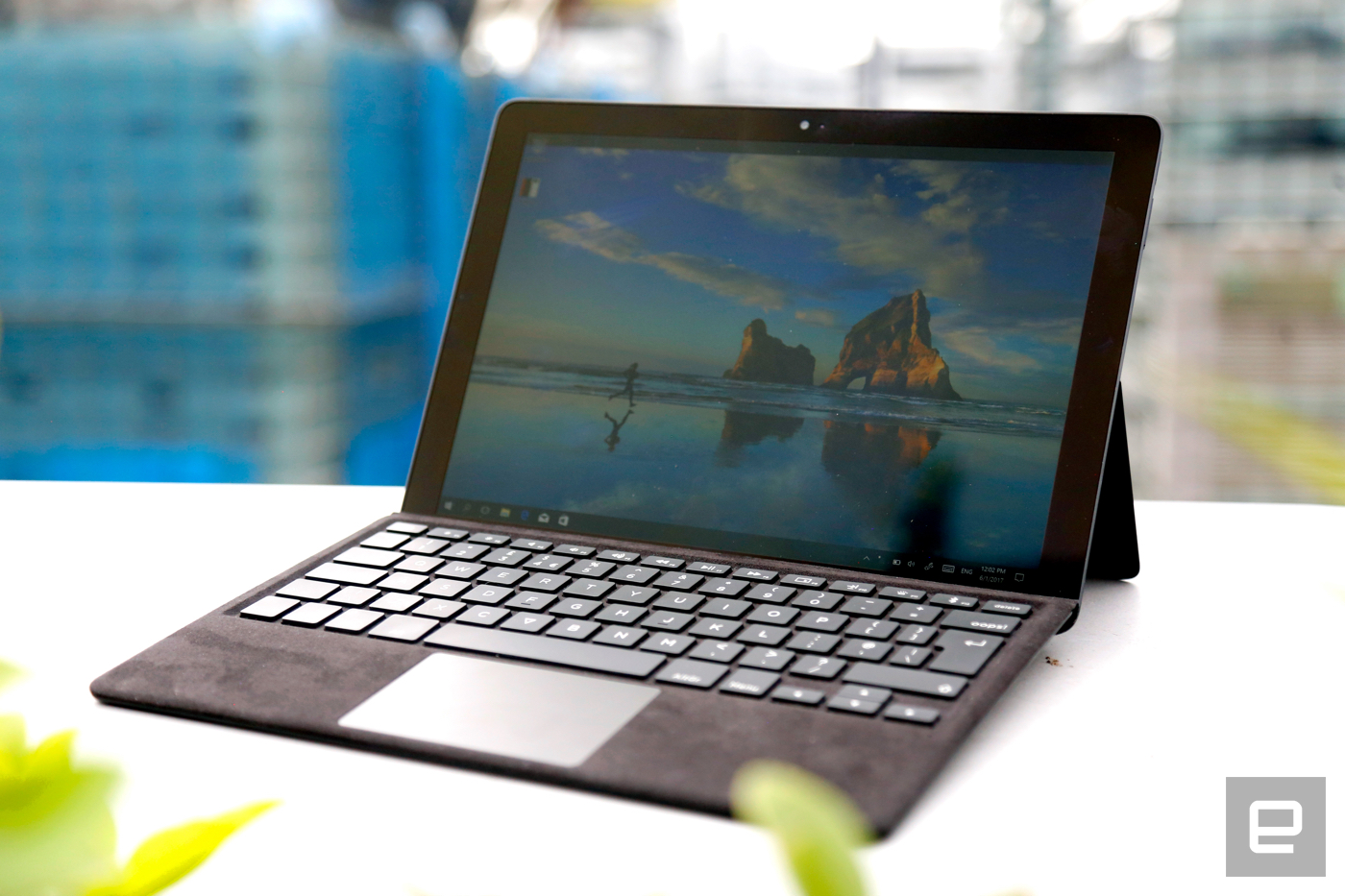 Chris Velazco/Engadget
Chris Velazco/Engadget
The Eve V convertible has become something of a media darling lately, mostly because it claims to be the first PC to be developed by consumers, not massive corporations. The idea of the populist PC was intriguing enough that Microsoft and Intel both worked with Eve to make the V happen, but c'mon -- we've seen countless, less ambitious projects fail after building loads of hype. (Especially on Indiegogo, where Eve raised over $1.4 million last year.) After spending a little time with the V at Computex though, the hype is starting to seem warranted.
The specs have been well-defined for a while now -- the Eve V will be available with Intel Core Y-series i3, i5 or i7 chipsets along with either 8 or 16GB of RAM. While you'll have to choose between 128, 256 and 512GB storage options, all versions of the Eve V pack a full complement of ports: two full-size USB 3.0 ports, two USB-C ports (one of which supports Thunderbolt 3) and a slot for microSD cards.
Meanwhile, the centerpiece is a 12.3-inch, 3:2 IGZO display running at 2736 x 1824. At 400 nits, it was plenty bright for the dim atmosphere in the Computex show hall, though it struggled when we took it for a spin under the bright Taipei sun.
Gallery: Hands-on with the Eve V | 18 Photos
 18
18



 +14
+14
All that's fine, but this is the first time we've see the Eve V in person. How well did all of these components come together? Well, considering this is the Eve's first original hardware project, I'd say that answer is "pretty damned well." The models we played with here at Computex weren't final yet, but even then, there was little to complain about. The V's aluminum unibody felt sturdy and well constructed; the fit and finish were mostly spot-on. Look closely enough at the machine and you'll find your share of whimsy, too. The backspace key just says "oops", and the area under the (quite nice) kickstand is subtly decorated with Eve logos.
It's a handsome machine even beyond those little touches. The Eve V is a bit thicker than the Surface Pro 4, but not to the point of ever feeling bulky. In fact, its gently angled body serves as a handsome counterpoint to Microsoft's flat Surface slab. CEO Konstantinos Karatsevidis told Engadget this slightly thicker body was one of the bigger decisions made by its community of crowdfunders. Turns out, they'd rather have a bigger body with better battery life than a slimmer machine that was forced to make compromises. Karatsevidis shied away from making firm battery claims, but he himself gets out 8 hours of fairly intense work out of the Eve V before needing a recharge.
 Chris Velazco/Engadget
Chris Velazco/Engadget
Even the keyboard manages to impress. Besides having multicolored backlit keys (another point the community insisted on), the Alcantara-coated keyboard also works when it's disconnected from the Eve V body. It's a neat touch, but I'm more impressed by the level of key travel and the responsiveness of the trackpad. If a device can't nail the basics, no amount of gimmicks can save it -- thankfully, that's not the case here.
Karatsevidis admits the company almost got it wrong a few times. Among the most notable near-misses for the CEO was ditching pen support altogether, a move the community strongly opposed. While the Eve V comes with a relatively basic stylus called the V Pen, the convertible also works fine with Microsoft's own Surface Pen. Design by committee gets a bad rap, but in this case, Eve had a legion of passionate fans who have a handle on what makes a compelling computer.
In short, it's an impressive machine, especially when you consider its unorthodox origins. The Eve V will start at $799, and is poised to offer more bang for the buck than the Surface Pro. So, what's the catch?
 Chris Velazco/Engadget
Chris Velazco/Engadget
Karatsevidis readily points to a few -- you'll only be able to get an Eve (or one of its possible sequels) online, in a bid to keep costs down. People interested in taking the plunge who haven't already locked down a unit are in a for a wait, too, and I want to see how well the small team grows to handle customer service.
Lingering questions also remain regarding the company's ability to spin up production and produce these things for the masses. After all, Karatsevidis's only experience delivering products was when the Eve released the T1, a white-label Windows tablet. Don't get me wrong: that takes work, but it's nowhere near as hard as building a product from scratch.
So yeah, there are many reasons to be skeptical. Still, I'm cautiously optimistic. Out of nowhere, a startup built a serious PC contender, and they've cleared the first hurdle -- building a device that feels worth using. Now it's time for the hard part: making these machines for everyone who wants one and keeping quality high along the way.
Click here to catch up on the latest news from Computex 2017!



 +14
+14